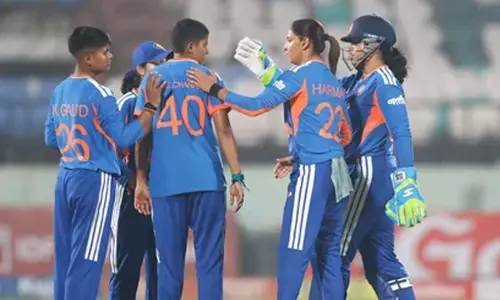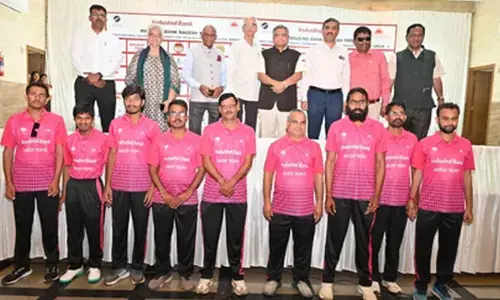Through the looking glass of the biz world

IMI, the top private Business school, offers a two-year Post Graduate Diploma in Management with a course fee of about Rs 17 lakh. It also offers a 15 months Executive Post Graduate Programme in Management. The CAT score that governs the eligibility criterion for this institute ranges from 92-95.
IMI, the top private Business school, offers a two-year Post Graduate Diploma in Management with a course fee of about Rs 17 lakh. It also offers a 15 months Executive Post Graduate Programme in Management. The CAT score that governs the eligibility criterion for this institute ranges from 92-95.
Professor Pinaki Dasgupta is Professor of Marketing and the Dean Corporate Relations and Placements at IMI. He has done his MBA from Purvanchal University, GCPCL at Harvard Business School and his Ph.D from the Banaras Hindu University. While in the city for the IMI Alumni meet, Professor Dasgupta spoke to Young Hans about the real life scenario of the corporate world and their recruits.
IMI was ranked number one among all private business schools in India, what is it that sets IMI apart?
Three things: Firstly, our student teacher ratio. We are doing really well under this criterion. In terms of intellectual capital we are really doing well. Our student-teacher ratio has been a really great strength. Second there is a major faculty crisis in most business schools. Indian b-schools are completely different from the rest of the world. We see that more and more of the faculty are isolated from the industry.
They are academicians in and out. However, in b-schools we don’t need academicians but people who were in the industry and have moved into the teaching profession. Our faculty combined have 200+ years of experience. This has been another factor resulting in our rank. Third, IMIs course curricula has constantly been updated.
What courses would you suggest as a specialisation in today’s market scenario?
There are five sectors today which are completely recession free which is banking and finance which includes insurance; retail; education; healthcare and the manufacturing sector. There are also a lot of allied sectors that are coming in. A lot of new concepts which are coming into businesses are trying to bring about professionalism into their businesses.
That’s where I think these sectors would go back and be the sunshine sectors and then there are these traditional employers that are always there - FMCG service sectors etc and in IT space there is a lot of scope in IT service management an IT enabled service.
Taking into consideration the marketing sector, do you think somewhere along the way ethics has been lost? Is IMI taking any steps towards this issue?
Everywhere there is a big loss on ethics and the major reason for all of it is that there is a major demand and supply gap. I think this is where the whole concept of regulatory bodies come in a big way. I think the finest example being the telecommunications sector and another sector being finance. Banking has also played to an advantage because of regulatory mechanisms. Marketing is a very dirty business but when a regulatory mechanism put into place it will work better.
IMI provides many courses for the same. There are some course like corporate social responsibilities, corporate governance, business ethics which go back to sensitise these students. Also a lot of soft skill workshops are held and we associate them with a lot of clubs and bring their social side and rather than their business side into perspective.
When it comes to recruiting for HR what is your opinion on the happening of today?
What we are finding is the basics of HR is completely outsourced, the kind of work that is actually happening has moved up in the value scale. For example, there is this entire field called the HR analytics. Let’s say a company like Marriott who for recruiting are asking people to play a game on their facebook page. One has to understand that things have changed and B-schools have to be in sync with that change.
The basics no longer survive. IMI has been able to come up in that arena. We are trying to go back and develop our complete curricula on soft skills. We have inculcated a lot of such courses like psychology, psychometric and other counselling aspects. We don’t see a lot of Psychology honors coming in, we still have a lot of people of hard skill coming in for HR. However, this needs to change for those with a soft skillset are the ones who will be a better fit.
Management is a course adopted by many with a conception that it assures them a job, what are your opinions on this?
7 years back a large number of the engineers would take up management. The recruiters today are very clear that they are looking for specialized profiles for example telecom they don’t simply take up marketing students but they take up they need engineers with telecom vertical experience with marketing specialization.
The B schools have to be very careful that these specializations will no longer be just about banking, finance and all but will also include experience. Which means a large number of people with work experience will be entertained. That’s the kind of churn that has taken place in this b school space, no more generalisation looking at specialists. If the guy is a fresher his chances of recruitment is very high. If he is with experience, there they look for extreme specialization. Freshers are doing well because they have a far better scope for being molded.
Social Media and Digital Marketing are booming sectors in today’s age. What do you think about the recruitments under them?
Lot of these organisations are talking about digital profiles which has been largely developed today. Today people are asking for those who have specialization and experience in social media marketing. we see shifts in these kinds of profiles also.
This has a lot of churn and more and more people would come up in these areas of digital marketing, cloud, the area of mobility and these would go very well with your MBA. All these analytic companies look for specializations. Maybe in the future e will have to see how we build up on this space.
In such a field practical knowledge is a must. How is IMI assisting the same?
We do three things to achieve the same:
1 We have something called a SIP: Summer internship programme, to sensitize them with a corporate world.
2. We do a lot of life projects with organisations. Like institutions who have 7-8months projects where students can do them from campus. There are some who extend their projects from the internship so this really helps them understand the organization and the industry in a better manner.
3. Thought leadership series where we have the people from the industry coming in to speak to the students. They also give away the human side of the business These are people who have large amount of experience who are usually our alums. 20-30% of the modules and delivered by people from the industry. This is how we sensitize our participants to the business world.
What have the recruitment patterns in IMI been like?
At IMI we have a 100% placement where 35-40% students are recruited by a mix of FMCG and electronics, 15% by the e-commerce space, 20% by banking and finance space and the remaining by consulting field and others. Largely private banks have been recruiting but today we even have nationalised banks coming in.
By:Shreya Mariam Job

















